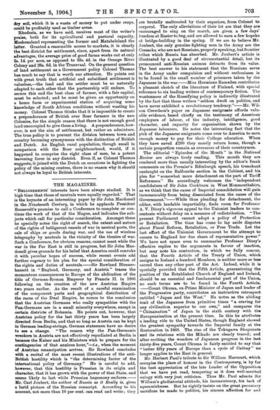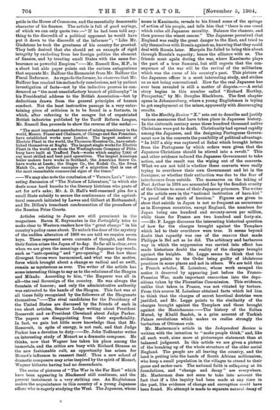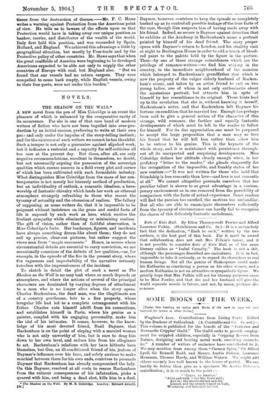" BELLIGERENTS' interests have been always studied. It is high
time that those of neutrals were equally regarded." That is the keynote of an interesting paper by Sir John Macdonell in the Nineteenth Century, in which he applauds President Roosevelt's promise to call a Conference to complete or con- tinue the work of that of the Hague, and indicates the sub- jects which call for particular consideration. Amongst these he specially notes the right of search, the extent and nature of the rights of belligerent vessels of war in neutral ports, the sale of ships or goods during war, and the use of wireless telegraphy by neutrals in the vicinity of the theatre of war. Such a Conference, for obvious reasons, cannot meet while the war in the Far East is still in progress, but Sir John Mac- donell gives grounds for his belief that America could convoke it with peculiar hopes of success, while recent events add further cogency to his plea for the special consideration of the rights and duties of neutrals.—Sir Rowland Blenner- hassett in "England, Germany, and Austria" traces the momentous consequences to Europe of the abdication of the title of German-Roman Emperor by Francis II. in 1806 following on the creation of the new Austrian Empire two years earlier. As the result of a careful examination of the component parts and geographical distribution of the races of the Dual Empire, he comes to the conclusion that the Austrian Germans who really sympathise with the Pan-Germans are in a small minority everywhere, except in certain districts of Bohemia. He points out, however, that Austrian policy for the last thirty years has been largely directed from Berlin, and that so long as Austria can be kept in German leading-strings, German statesmen have no desire to see a change. "The reason why the Pan-Germanic wreckers in Austria are not effectively repudiated at Berlin is because the Kaiser and his Ministers wish to prepare for the contingencies of that anxious hour,"—i.e., when the moment of Austrian emancipation arrives. Sir Rowland concludes with a recital of the most recent illustrations of the anti- British hostility which is "the determining factor of the international policy of Germany." He is careful to add, however, that this hostility is Prussian in its origin and character, that it has grown with the power of that State, and seems likely to last while Prussian hegemony endures.— Mr. Carl Joubert, the author of Russia as it Really is, gives a lurid picture of the Russian conscript. According to his account, not more than 10 per cent, can read and write ; they
are brutally maltreated by their superiors, from Colonel to corporal. The only alleviations of their lot are that they are encouraged to sing on the march, are given a few days' freedom at Easter to beg, and are allowed to earn a few kopeks at bridge-building in the spring. If we are to believe Mr. Joubert, the only genuine fighting men in the Army are the Cossacks, who are not Russians, properly speaking, but frontier tribes which Russia has absorbed. Mr. Joubert's article is illustrated by a good deal of circumstantial detail, but its pronounced anti-Russian animus detracts from its value. The best answer to his statement that the Russians serve in the Army under compulsion and without enthusiasm is to be found in the small number of prisoners taken by the Japanese in the war.—Miss Hermione Ramsden contributes a pleasant sketch of the literature of Finland, with special reference to six leading writers of contemporary fiction. The wantonness of the Russifying policy is indirectly illustrated by the fact that these writers "seldom dwell on politics, and have never exhibited a revolutionary tendency."—Mr. Wil- son Crewdson's paper on Japanese emigrants affords valu- able evidence, based chiefly on the testimony of American employers of labour, of the industry, intelligence, good character, and capacity for organisation shown by the Japanese labourers. He notes the interesting fact that the pick of the Japanese emigrants come over to America to earn enough money to pay for their College education. When they have saved 2200 they mostly return home, though a certain proportion remain as overseers of their countrymen.
The editorial "Episodes of the Month" in the National Review are always lively reading. This month they are rendered more than usually interesting by the editor's frank comments on the Premier's Edinburgh speech, his trenchant onslaught on the Balfourite section in the Cabinet, and his plea for "somewhat more detachment on the part of Tariff Reformers." He accordingly welcomes the "independent candidature of Sir John Cockburn in West Monmouthshire, as we think that the cause of Imperial consolidation will gain immeasurably from being dissociated from the cause of the G-overnment."—While thus pleading for detachment, the editor, with laudable impartiality, finds room for Professor A. V. Dicey's vigorous appeal to the Unionist leaders to con- centrate without delay on a measure of redistribution. "The present Parliament cannot adopt a policy of Protection or Retaliation. The time has come to lay aside disputes about Fiscal Reform, Retaliation, or Free Trade. Let the last effort of the Unionist Government be the attempt to ensure to England her due share of representative power." We have not space even to summarise Professor Dicey's effective replies to the arguments in favour of inaction, but may note his contention, in which we fully concur, that the Fourth Article of the Treaty of Union, which assigns to Ireland a hundred Members, is neither more or less sacred than any other part of the Act. Indeed, while it is specially provided that the Fifth Article, guaranteeing the position of the Established Church of England and Ireland, should be an essential and fundamental part of the Union, no such terms are to be found in the Fourth Article. —Count Okuma, ex-Prime Minister of Japan and leader of the Progressive party, contributes an instructive retrospect entitled "Japan and the West." He notes as the abiding trait of the Japanese from primitive times "a craving for any civilisation superior to our own," and compares the " Chinaisation" of Japan in the sixth century with the Europeanisation at the present time. In this he attributes a leading role to the United States, though England showed the greatest sympathy towards the Imperial family at the Restoration in 1868. The rise of the Tokugawa Shogunate and its relations with the Mikado are clearly traced; and after reciting the wonders of Japanese progress in the last thirty-five years, Count Okuma is fairly entitled to say that "better fifty years of Europe than a cycle of Cathay" no longer applies to the East in general.
Mr. Herbert Paul's tribute to Sir William Harcourt, which occupies the place of honour in the Contemporary, is by far the best appreciation of the late Leader of the Opposition that we have yet read, tempering as it does well-merited eulogy with very just criticism. Thus Mr. Paul admits Sir William's gladiatorial attitude, his inconsistency, his lack of squeamishness. But he rightly insists on the great pecuniary sacrifices he made to politics, his sincere affection for and
of which we can only quote two :—" If he had been told any- thing to the discredit of a political opponent he would have put it down to the discredit of the informer" ; "Like Mr.
Gladstone he took the greatness of his country for granted. They both desired that she should set an example of rigid integrity by excluding from her foreign politics the element of finance, and by treating small States with the same for- bearance as powerful Empires."—Mr. Russell Rea, M.P., in a short but able paper points out the curious antagonisms that separate Mr. Balfour the Economist from Mr. Balfour the Fiscal Reformer. As regards the former, he observes that Mr.
Balfour has reached his melancholy conclusions, not by patient investigation of facts—not by the inductive process he con- demned as "the most unsatisfactory branch of philosophy" in his Presidential address to the British Association—but by deductions drawn from the general principles of human conduct. Not the least instructive passage in a very enter- taining piece of criticism is to be found in a footnote, in which, after referring to the meagre list of expatriated British industries published by the Tariff Reform League, Mr. Russell Rea proceeds to show the reverse of the medal:—
"The most important manufacturers of mining machinery in the world, Messrs. Fraser and Chalmers, of Chicago and San Francisco, have established works near London. The largest makers of Electric Plant in the world, the Thomson-Houston Co., have estab- lished themselves at Rugby. The largest single works for Electric Plant in the world are those the Westinghouse Company of Pitts- burg have built at Trafford Park—works which employ 7,000 of our most skilled and best paid operatives. The largest American boiler makers have works in Scotland; the American Screw Co. have works at Leeds ; the Singer Co., the Kodak Co., the Swan Match Co., are further examples of a migration that is one of the most remarkable commercial signs of the times."
—We may also note the conclusion of "Vernon Lee's" inter- esting discussion of "The Nature of Literature," in which she deals some hard knocks to the literary histrions who prate of art for art's sake; Mr. A. D. Hall's well-reasoned plea for a small State subsidy to secure the continuance of the agricul-
tural research initiated by Lawes and Gilbert at Rothamsted; and Dr. Dillon's trenchant condemnation of the procedure of the Russian Prize Courts.
Articles relating to Japan are still prominent in the magazines. Baron K. Suyematsu in the Fortnightly tries to make clear to Western readers how the "great change" in his
country's policy came about. To unlock the door of the mystery of the sudden alteration of 1868 we are told we require seven keys. These represent seven currents of thought, and from their fusion arises the Japan of to-day. So far all is clear, even when we are given the meanings of these Japanese key-words, such as "anti-opening" and "pro-opening." But how these divergent forces were harmonised, and what was the motive, force which brought about a change so radical and so swift,
remain as mysterious as ever. The writer of the article has some interesting things to say as to the relations of the Shogun and Mikado. According to him, "the Emperor was all in all—the real Sovereign of the country. He was always the fountain of honour; and only the administrative authority was entrusted to the hands of the Shogun. This fact was at all times fully recognised by the followers of the Shogunate themselves."—The rival candidates for the Presidency of the United States are discussed by the friends of each in two short articles, Senator Lodge writing about President Roosevelt and ex-President Cleveland about Judge Parker. The papers are disappointing from their superficiality. In fact, we gain but little more knowledge than that Mr.
Rossevelt, in spite of energy, is not rash, and that Judge Parker has a devotion to duty.—Dr. John Todhunter writes an interesting study of Mozart as a dramatic composer. He thinks, now that Wagner has taken his place among the immortals, and the critics are busy with Richard Strauss as the new fashionable cult, an opportunity has arisen for Mozart's influence to reassert itself. Thus a new school of dramatic composers may arise inspired by the spirit of Mozart, Wagner hitherto having had no descendants.
The series of pictures of "The War in the Far East" which have been appearing in Blackwood still continues, and the present instalment is a very striking one. An Englishman makes the acquaintance in this country of a young Japanese officer who is eagerly studying the West. The Japanese, whose name is Kamimoto, reveals to his friend some of the springs of action of his people, and tells him that "there is one creed which rules all Japanese morality. Balance the chances, and then pursue the wisest course." The Japanese perceived that England was really the great danger to the East, and tried to ally themselves with Russia against us, knowing that they could deal with Russia later. Marquis Ito failed to bring this about through Russia's rapacity ; hence the alliance with us. The friends meet again during the war, where Kamimoto plays the part of a true Samurai, but still regrets that the con- sequence of the war will be the revival of the militarism which was the curse of his country's past. This picture of the Japanese officer is a most interesting study, and strikes us as not being conventional. How far the real Japanese has ever been revealed is still a matter of dispute.—A serial story begins in this number called "Richard Hartley, Prospector," by Mr. Douglas Blackburn. The first chapter opens in Johannesburg, where a young Englishman is trying to get employment at the mines, apparently with discouraging results.
In the Monthly Review "X." sets out to describe and justify various massacres that have taken place in Japanese history. In the sixteenth century some three hundred thousand native Christians were put to death. Christianity had spread rapidly among the Japanese, and the designing Portuguese Govern- ment saw in the converts the possibility of political advantage. "In 1617 a ship was captured at Sakai which brought letters from the Portuguese by which orders were given that the Japanese Christians should be stirred into a revolt." This and other evidence induced the Japanese Government to take action, and the result was the wiping out of the converts. What we are not told is whether these converts were really trying to overthrow their own Government and let in the foreigner, or whether their extinction was due to the fear of interference from outside. The massacres on the taking of Port Arthur in 1891 are accounted for by the fiendish cruelty of the Chinese to some of their Japanese prisoners. The writer of the article sees in the "national institution of hama-kin" "a proof of the spirit of heroism." Figures are given to• show that suicide in Japan is not so frequent an occurrence as in European countries, except England, the numbers for Japan being one hundred and seventy-seven per million, while those for France are two hundred and forty-six.
Mr. F. Legge discusses the interesting historical question of how far the charges brought against the Templars which led to their overthrow were true. It seems beyond doubt that rapacity was one of the reasons that made Philippe le Bel act as be did. The arbitrary and barbarous way in which the suppression was carried into effect has made historians doubt the reality of the charges brought against the knights. Mr. Legge seems to think that the evidence points to the Order being guilty of idolatrous practices in some places and not in others. We are told that a French scholar, M. Loiseleur, whose work escaped the notice it deserved by appearing just before the Franco- Prussian War, made important researches into the depo- sitions taken by the Florentine Commission. This evidence, unlike that taken in France, was not vitiated by torture. From this source M. Loiseleur obtained facts which led him to think that the charges of secret heretical doctrine were justified, and Mr. Legge points to the similarity of the charges brought against the Templars and those brought against the Manichaeans.—The history of the Sultan. Murad, by Khalil Sa.adeh, is a grim account of Turkish Palace revolutions which makes us realise strongly the barbarism of Ottoman rule.
Mr. Masterman'e article in the Independent Review is written with the intention to "make people think," and, like all such work, aims more at picturesque statement than at balanced judgment. In this article we are given a picture of the breaking up of the whole structure of the older social England. The people are all leaving the country, and the land is getting into the hands of South African millionaires, who keep a small population in the villages to attend to their game and motor-cars. The national faith is collapsing at its foundations, and "change and decay" are everywhere. Mr. Masterman does not seem to take into account the fact that if a like inquiry had been made at any time in the past, like evidence of change and corruption could have been found. No attempt is made to separate natural decay of
tissue from the destruction of disease.—Mr. F. C. Howe writes a warning against Protection from the American point of view. He tells BE to beware of the effects upon us that Protection would have in taking away our unique position as banker, carrier, and distributor of the wealth of the world. Italy first held this position, and was succeeded by Spain, Holland, and England. We achieved this advantage a little by geographical situation, but mostly by Free-trade and by the Protective policy of other countries. Mr. Howe says that when the great coalfields of America were beginning to be developed Americans expected to be able not only to supply the other countries of Europe with coal, but England also. "But we found that our vessels had no return cargoes. They were compelled to come back empty, while English vessels, owing to their free ports, were not under this burden."
NOVELS.




























































 Previous page
Previous page